Building Emotional Competence in Treatment
Emotional skill-building is transforming the landscape of addiction and mental health treatment. By empowering individuals to regulate their emotions effectively, treatment programs significantly enhance recovery success rates and support long-term sobriety. This article explores how developing emotional regulation and related skills forms a cornerstone of comprehensive treatment, improving psychological well-being, reducing relapse risk, and promoting holistic recovery outcomes.
Understanding Comprehensive Treatment Services for Addiction and Mental Health

What are the comprehensive treatment services available for substance abuse?
Comprehensive treatment services for substance abuse encompass a wide spectrum of evidence-based approaches designed to meet diverse individual needs. These services typically include detoxification, which safely manages withdrawal symptoms; individual and group counseling to address behavioral patterns; medication-assisted treatment (MAT) to support physiological recovery; and various levels of inpatient, residential, and outpatient rehabilitation programs.
These treatments are provided through accredited community mental health centers and specialized programs tailored to specific populations, such as pregnant women or individuals struggling with methamphetamine addiction. Additionally, nationally available crisis intervention services—including the 988 hotline and regional care facilities—offer immediate assistance for mental health and substance use emergencies.
Beyond these direct interventions, prevention programs play a vital role by engaging communities, schools, families, and individuals to foster wellness and minimize substance use risks. Organizations like Acadia Healthcare operate extensive networks of facilities across regions, delivering personalized, multidisciplinary care while maintaining rigorous accreditation standards. This broad ecosystem ensures quality and comprehensive support throughout the recovery journey.
How is emotional skill-building integrated within treatment programs?
Emotional skill-building is a foundational component of modern addiction treatment programs. Recognizing that many individuals use substances to cope with overwhelming emotions such as stress, anxiety, or depression, integrating emotional regulation techniques empowers patients to develop healthier coping mechanisms.
Programs incorporate strategies such as mindfulness practices, cognitive restructuring, behavioral activation, and distress tolerance to aid in recognizing and managing emotional triggers. Treatments like Dialectical Behavior Therapy (DBT) and Cognitive Behavioral Therapy (CBT) specifically target emotional dysregulation by fostering awareness, acceptance, and modification of maladaptive emotional responses.
Emotional skill-building also includes practical steps like practicing delayed gratification and engaging in self-care activities (e.g., exercise, journaling, meditation). By embedding these techniques into treatment plans, providers reduce relapse risks and equip individuals with tools for long-term sobriety and improved mental well-being.
What types of therapies are commonly used?
Several therapeutic models are employed to nurture emotional regulation and support recovery. These include:
- Dialectical Behavior Therapy (DBT): Incorporates mindfulness, distress tolerance, interpersonal effectiveness, and emotion regulation skills, particularly effective in treating addiction.
- Cognitive Behavioral Therapy (CBT): Focuses on identifying and changing negative thought patterns and behaviors.
- Emotion-Focused Therapy (EFT): Helps individuals process and transform emotional experiences.
- Expressive Arts Therapy: Utilizes creative modalities to explore emotions and encourage self-expression.
Mindfulness-based practices, such as meditation and yoga, are woven into many treatment frameworks to boost present-moment awareness and reduce stress. Coping skills training equips individuals with techniques like deep breathing and journaling to manage cravings and uncomfortable emotions.
What support resources enhance treatment outcomes?
Support systems are critical for sustaining recovery and building emotional resilience. Therapy and counseling increase self-awareness, helping individuals uncover and address triggers, co-occurring disorders like depression or anxiety, and relational challenges. Peer support groups and community resources foster social connection, essential for motivation and relapse prevention.
Holistic treatment approaches integrate mental health services with addiction care, emphasizing wellness, aftercare planning, and life skills development. Practical skills such as communication, self-management, and stress coping empower individuals to navigate daily challenges independently.
Overall, comprehensive addiction treatment blends evidence-based clinical interventions with emotional skill-building and robust support networks to promote lasting recovery and improved quality of life.
The Crucial Role of Emotional Regulation in Addiction Recovery
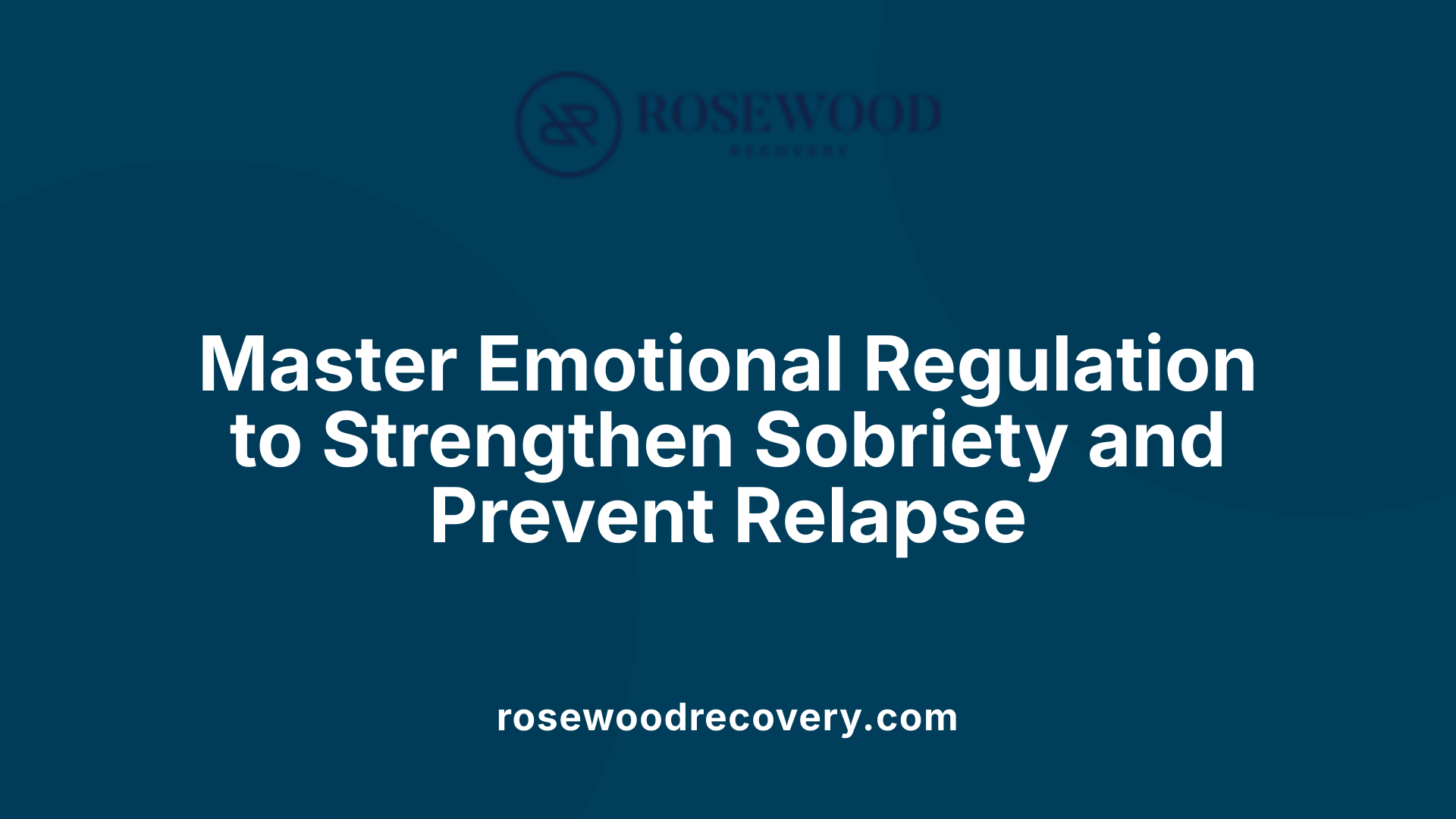
What is Emotional Regulation and Why is it Important?
Emotional regulation is the ability to identify, manage, and modify one’s emotional responses. This skill is essential not only for psychological well-being but also for sustaining sobriety in addiction recovery. When individuals can effectively regulate emotions, they experience improved mental health, enhanced relationships, and greater self-confidence.
How Does Emotional Dysregulation Underpin Substance Use?
Many people turn to substances as a way to cope with overwhelming feelings such as stress, anxiety, depression, or emotional instability. Research shows that a significant portion of those with addictions—about 75%—struggle with emotional dysregulation. When emotions become unmanageable, substances often serve as a harmful coping mechanism to dull or escape distressing feelings.
What Role Does Emotional Regulation Play in Preventing Relapse?
Effective emotional regulation helps individuals recognize emotional triggers that may spark cravings or urges to use substances. By practicing delayed gratification and employing coping strategies like mindfulness and distress tolerance, individuals can better manage their impulses. This greatly reduces the risk of relapse and supports long-term recovery.
How Can Emotional Regulation Replace Harmful Coping Mechanisms?
Developing emotional regulation equips individuals with healthier ways to handle difficult emotions. Techniques such as cognitive restructuring, behavioral activation, journaling, mindfulness meditation, and deep breathing allow for emotional awareness and processing without substance use. Furthermore, therapeutic methods like Dialectical Behavior Therapy (DBT) and Cognitive Behavioral Therapy (CBT) teach emotional skills that foster resilience, making it easier to maintain sobriety and improve overall mental wellness.
Evidence-Based Therapies Enhancing Emotional Skills
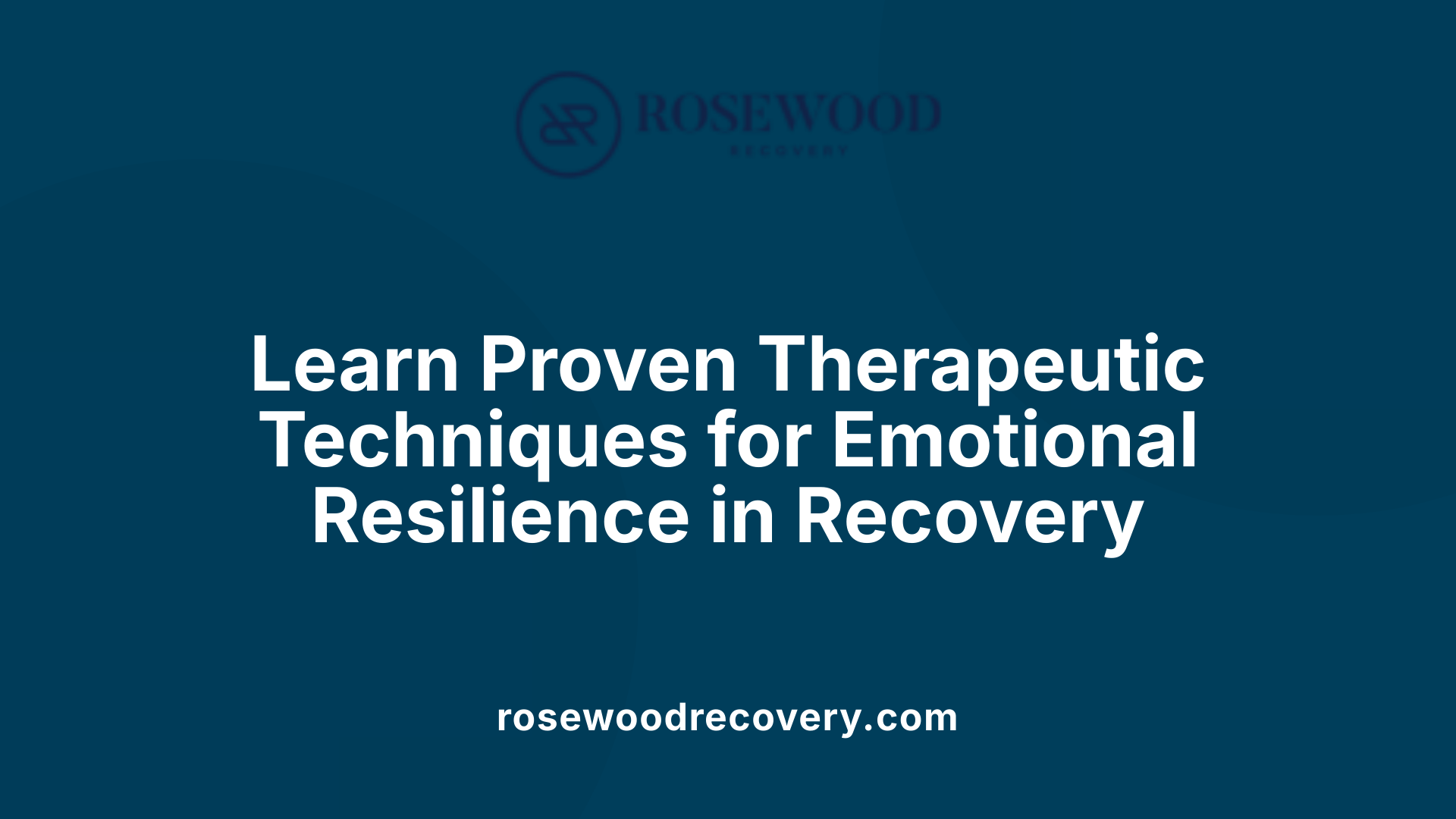
What Are Some Therapies Used to Develop Emotional Regulation in Addiction Treatment?
Several evidence-based therapies focus on improving emotional regulation skills to support addiction recovery. These therapies help individuals identify, understand, and manage their emotional responses, which is crucial for preventing relapse and sustaining sobriety.
Cognitive Behavioral Therapy (CBT)
CBT is widely used to teach emotional regulation by helping individuals recognize and change negative thought patterns that contribute to substance use. It encourages behavioral activation and cognitive restructuring to replace harmful coping mechanisms with healthier alternatives.
Dialectical Behavior Therapy (DBT)
DBT integrates mindfulness, distress tolerance, interpersonal effectiveness, and emotional regulation skills. It is particularly effective for individuals struggling with addiction, as it provides practical tools to manage overwhelming emotions and reduce impulsive behaviors.
Emotion-Focused Therapy (EFT)
EFT centers on increasing emotional awareness and processing underlying feelings related to addiction. By addressing emotional pain and trauma, it supports healthier emotional expression and regulation.
Expressive Arts Therapy
This therapy utilizes creative outlets like art, music, and writing to help individuals process emotions in a nonverbal way. It promotes emotional awareness and provides alternative techniques for managing difficult feelings.
Mindfulness and Meditation Techniques
Incorporating mindfulness and meditation increases present-moment awareness, reduces stress, and enhances self-regulation. These practices are often integrated into therapy to support emotional resilience and reduce cravings.
Overall, these therapies equip individuals with a diverse set of emotional regulation skills that not only address immediate emotional challenges but also foster long-term psychological well-being and sustained recovery.
Integrating Mental Health Support to Enhance Emotional Resilience
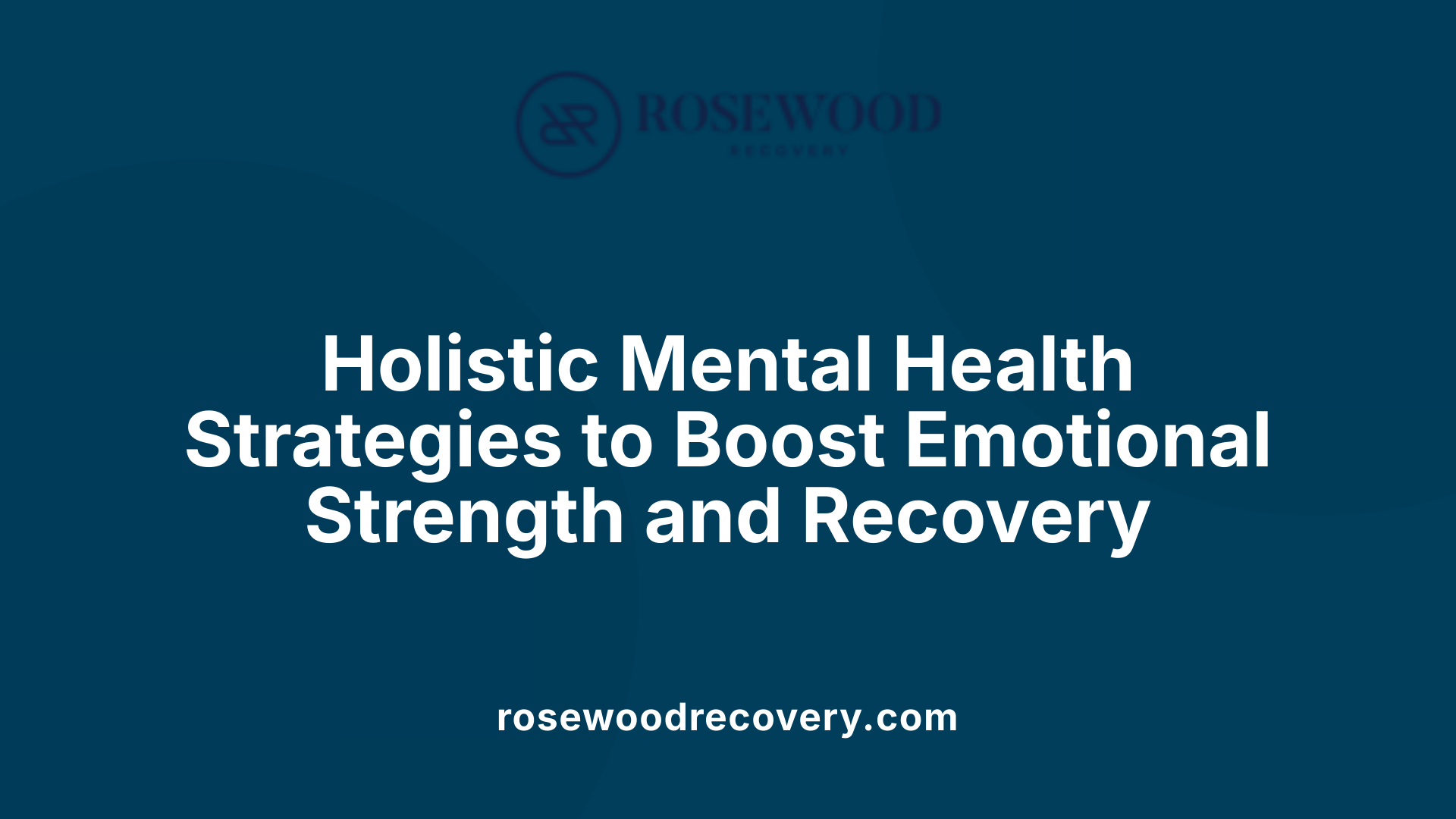
How are mental health issues addressed in addiction treatment programs?
Mental health issues in addiction treatment are addressed through integrated care models that focus on treating both substance use disorders and co-occurring mental health conditions simultaneously. These programs start with comprehensive screening to identify disorders such as depression, anxiety, or emotional dysregulation that frequently accompany addiction.
Tailored interventions include therapy options like Cognitive Behavioral Therapy (CBT) and Dialectical Behavior Therapy (DBT), both of which teach emotional regulation skills crucial for recovery. Medications may be used when appropriate to manage psychiatric symptoms, while psychosocial support, including peer groups and family therapy, bolsters the individual's recovery environment.
Specialists collaborate to create personalized treatment plans that cover individual and group therapy sessions to address emotional triggers and build coping mechanisms essential for maintaining sobriety. This holistic approach helps individuals develop resilience to stress and cravings, thereby reducing relapse risk and improving overall mental health and recovery outcomes.
Building coping mechanisms and motivation
Mental health support empowers individuals to cultivate coping skills such as mindfulness, deep breathing, journaling, and stress management techniques. Developing these methods strengthens emotional resilience, enabling better management of anxiety, stress, and negative emotions without resorting to substance use.
Therapeutic counseling also promotes self-awareness and motivation by helping individuals explore their personal values and recovery goals. Increased self-esteem and a more positive self-image emerging from therapy boost commitment to sobriety and long-term success.
Importance of therapy and counseling
Therapy and counseling play a pivotal role in addiction recovery by addressing both emotional regulation and mental health concurrently. They provide safe spaces for clients to explore underlying emotional causes of addiction, process trauma, and develop healthier interpersonal relationships.
Through these support systems, individuals learn communication and social skills, contributing to stronger support networks critical for sustained recovery. Therapy also assists in managing co-occurring disorders, which significantly increases the chances of successful treatment and relapse prevention.
By integrating mental health support into addiction treatment, programs offer a comprehensive strategy that tackles emotional challenges and fosters resilience, helping individuals maintain sobriety and enhance overall well-being.
Developing Life Skills to Support Emotional and Social Well-being
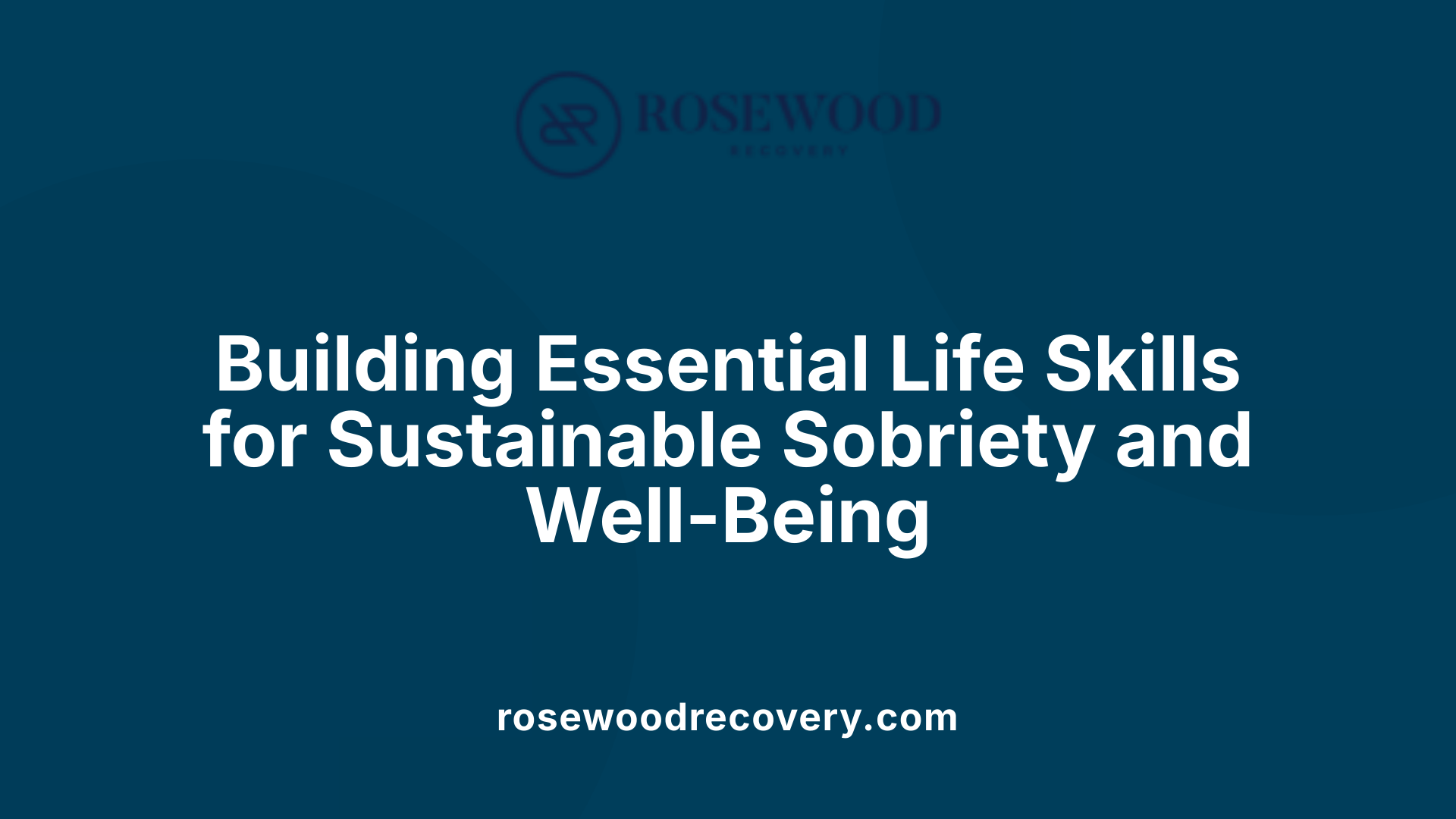
Why Are Life Skills Important in Recovery?
Life skills play a crucial role in recovery from substance use and mental health disorders by supporting physical, psychological, and social well-being. These foundational skills help individuals adapt positively to daily challenges, making recovery sustainable over the long term.
What Are the Categories of Life Skills?
The development of life skills can be categorized into three main areas:
- Self-awareness: Includes stress management, emotional regulation, positive thinking, and building self-esteem.
- Interpersonal skills: Encompasses empathy, active listening, relationship management, conflict resolution, and effective communication.
- Thinking skills: Involves goal setting, decision-making, problem-solving, critical and creative thinking, and resilience.
What Basic Skills Are Needed for Independent Living?
Independent living relies on practical abilities such as:
- Communication and socialization
- Financial management
- Domestic tasks and self-care
- Grocery shopping and healthy eating
- Time and medication management
- Transportation and stress coping
These basic skills support day-to-day functioning and contribute significantly to maintaining sobriety.
How Does Developing Life Skills Impact Maladaptive Coping and Emotional Health?
Engaging in life skills training helps individuals reframe negative thoughts, reduce feelings of failure and rejection, and alleviate symptoms of depression and anxiety. This process effectively dismantles maladaptive coping strategies, replacing them with healthier ways to handle stress and emotions.
In summary, cultivating life skills strengthens emotional intelligence, enhances motivation, and improves social relationships, all of which are vital for a balanced life and successful long-term recovery.
The Impact of Support Groups on Emotional Skill Reinforcement and Recovery
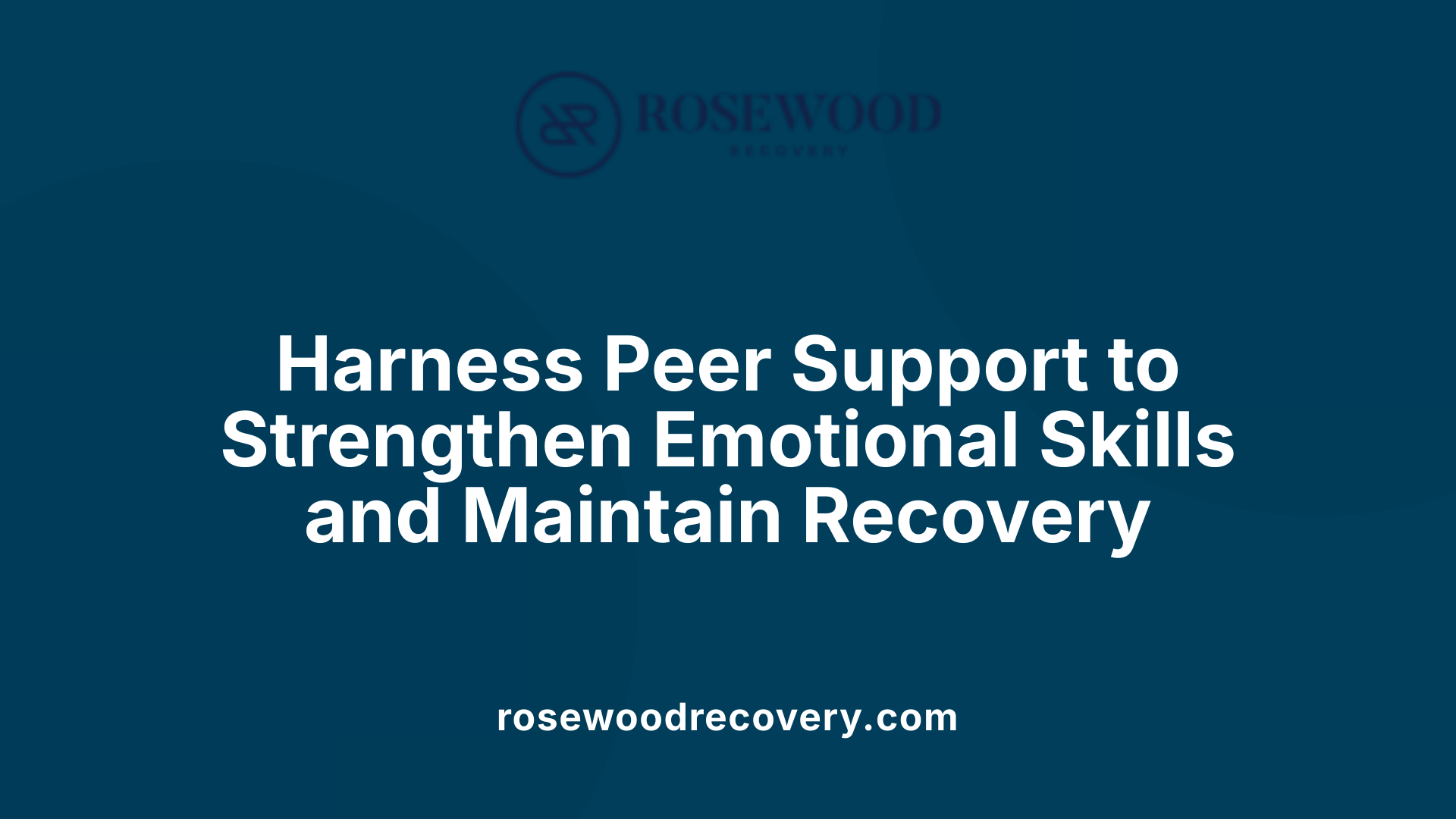
What role do support groups play in addiction recovery?
Support groups are fundamental in addiction recovery because they offer peer support and foster a sense of community. By connecting with others facing similar challenges, individuals experience less isolation and more encouragement, which boosts emotional resilience.
Role of peer support in emotional resilience
Peer support provides a safe space to share struggles and successes, allowing members to learn emotional regulation strategies from each other. This shared experience builds emotional strength and helps manage complex feelings like stress and anxiety without turning to substances.
Social connection and motivation
Participating in groups such as Alcoholics Anonymous (AA), Narcotics Anonymous (NA), or secular programs nurtures social bonds and enhances motivation. Feeling understood and supported increases commitment to recovery goals and reinforces a positive self-image crucial for sustained sobriety.
Managing triggers and cravings
Support groups help members identify emotional triggers and develop practical coping mechanisms. The group setting encourages practicing delayed gratification and mindfulness, aiding in craving management and relapse prevention.
Complementing professional treatment
Support groups serve as a vital complement to professional therapies like Cognitive Behavioral Therapy (CBT) or Dialectical Behavior Therapy (DBT). They reinforce emotional regulation skills taught in therapy while providing ongoing encouragement, strengthening relapse prevention, and improving overall mental health.
In summary, support groups enhance emotional regulation by fostering peer connections, offering social motivation, and providing practical tools to manage triggers. They work alongside formal treatments to support long-term recovery success.
Relapse Prevention through Emotional Awareness and Regulation
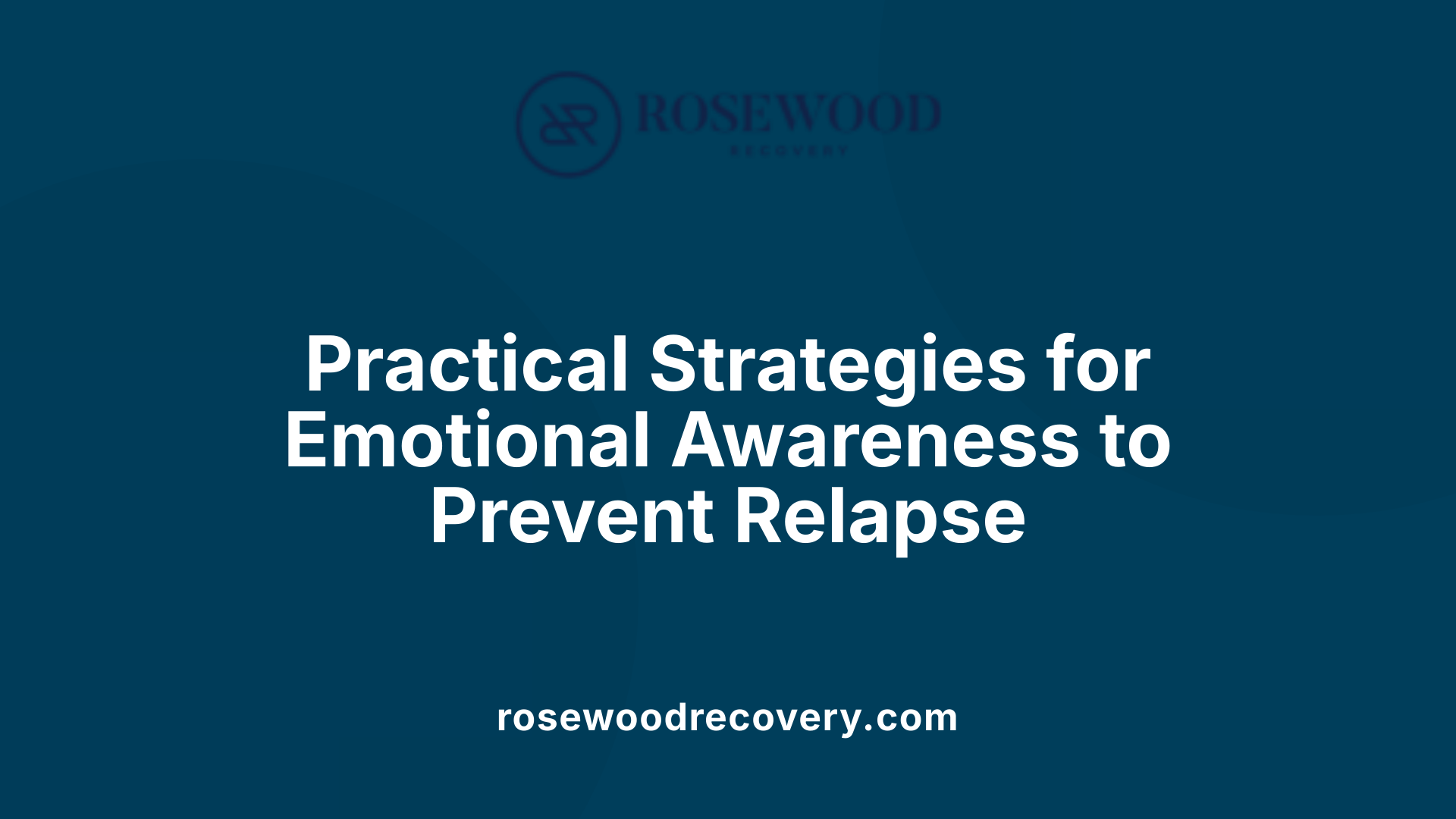
Recognizing Emotional Triggers
One of the foundational steps in relapse prevention is recognizing emotional triggers that can provoke cravings or emotional distress. These triggers often stem from stress, anxiety, depression, or unresolved emotional issues. By identifying these early warning signs, individuals can implement strategies to manage responses before turning to substances. Developing self-awareness through therapy and mindfulness practices enhances this crucial recognition.
Practicing Delayed Gratification
Delayed gratification plays a key role in managing urges. It involves consciously postponing immediate reactions, allowing emotions and cravings to pass without acting on them impulsively. Practicing this skill strengthens self-control, enabling individuals to respond to challenging situations with healthier choices rather than relapse.
Coping Strategies to Avoid Relapse
Effective coping strategies bolster resilience against relapse. Techniques include cognitive restructuring to alter negative thought patterns, distress tolerance skills to handle uncomfortable emotions, and engaging in healthy activities such as exercise, meditation, journaling, or creative outlets. Support from therapy, peer groups, and counseling also provides essential encouragement and accountability during high-risk moments.
Importance of Emotional Skill-Building in Relapse Prevention
Building emotional regulation skills is vital for sustaining long-term sobriety. Therapies like Cognitive Behavioral Therapy (CBT) and Dialectical Behavior Therapy (DBT) focus on nurturing these skills by teaching mindfulness, emotional awareness, interpersonal effectiveness, and stress management. Strengthening emotional resilience reduces the likelihood of relapse by helping individuals navigate complex feelings, stress, and anxiety without substance use.
How do relapse prevention strategies enhance treatment outcomes?
Relapse prevention strategies improve treatment outcomes by equipping people to manage triggers and high-risk scenarios actively. Approaches such as cognitive-behavioral therapy and motivational interviewing focus on strengthening coping mechanisms and fostering an environment conducive to recovery. Tailoring these plans to individual needs—including emotional health and co-occurring issues—maximizes effectiveness. Incorporating mindfulness, lifestyle changes, and continuous monitoring further lowers relapse risk, supporting stable, substance-free lives.
Holistic Approaches for Sustained Recovery: Wellness, Aftercare, and Emotional Skill-Building
How does integrating physical, mental, and emotional health support recovery?
A holistic approach to addiction recovery addresses physical health, mental wellness, and emotional regulation together, creating a comprehensive foundation for sustained sobriety. Physical well-being supports brain health and stress management, while mental health support helps tackle co-occurring disorders like anxiety and depression. Emotional regulation skills—including mindfulness and coping strategies—equip individuals to manage cravings and triggers without returning to substance use.
What self-care practices support emotional resilience?
Daily self-care routines play a crucial role in building emotional resilience. Healthy habits such as regular exercise, meditation, journaling, and engaging in creative activities help regulate emotions and reduce stress. Ensuring adequate sleep, balanced nutrition, and participation in hobbies further strengthen one’s ability to withstand emotional challenges and maintain recovery momentum.
Why is aftercare planning important for maintaining skills and sobriety?
Aftercare planning extends recovery support beyond initial treatment, ensuring that emotional regulation techniques and self-care practices remain integrated into daily life. Continuing therapy, peer support groups, and counseling reinforce resilience, help recognize new triggers, and prevent relapse. Structured aftercare fosters long-term commitment to wellness and strengthens coping mechanisms as individuals face life’s ongoing challenges.
What are the benefits of targeting emotional triggers and wellness in recovery?
Targeting emotional triggers directly reduces relapse risk by allowing individuals to anticipate and manage stressors effectively. Cultivating wellness through mindfulness, cognitive-behavioral therapies, and emotional intelligence development enhances self-awareness and motivation. This comprehensive focus not only supports long-term sobriety but also improves relationships, boosts self-confidence, and promotes overall mental well-being.
The Transformative Power of Emotional Skill-Building in Treatment
Emotional skill-building is central to transforming addiction and mental health treatment outcomes. Developing emotional regulation and related competencies equips individuals to face challenges with resilience, manage cravings effectively, and foster healthier relationships—all critical for sustained sobriety. Integrated treatments that combine evidence-based therapies, mental health support, life skills training, and supportive peer networks create a comprehensive framework empowering individuals on their recovery journey. As emotional intelligence and coping strategies strengthen, individuals not only reduce the risk of relapse but also enhance their overall quality of life, paving the way for lasting wellness and independence.
References
- Emotional Regulation in Recovery | Addiction Treatment
- Empowering Wellness: Emotional Regulations Impact On ...
- Emotional Regulation in Addiction Treatment at Antrim, NH
- 10 Benefits of Integrating Mental Health Support in ...
- The Benefits of Learning Life Skills in Recovery
- Building Emotional Intelligence in Addiction Rehab
- Levels of Care for Addiction Treatment
- Treatment of Substance Use Disorders
- Relapse Prevention Strategies and Techniques for Addiction
- Addiction Relapse Prevention - StatPearls - NCBI Bookshelf




